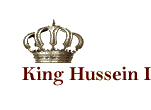 |
 |
Defending the Faith Interfaith Dialogue and Tolerance Our religion does not discriminate according to color, sex or anything else. What counts is piety and faith. Address on the 45th Anniversary of King
Hussein’s Assumption of his Constitutional Powers
In general, I believe the judgment that we receive comes after our death, based on what we have done in this life. It has to do with the Almighty, and also with the judgment of people after we are gone. I'm not for excess in anything, including so-called freedom. But I would never appoint myself a judge; to say that because I disapprove of how someone has behaved he is no longer a Muslim. That is something that is beyond me or anyone else . . . I don't think that individual leaders have the right to determine who lives and who dies. There are many ways of examining these matters. I do not stand with much that is decreed, and sometimes followed up by action, along these lines. I've read what Rushdie has written and it was very deeply offensive and very deeply objectionable. But I would not sanction murder and wouldn't expect anyone I know to do that. Interview with Milton Viorst
Fundamentalism as it is called is not confined to the Muslim world. It is something that we have seen in different parts of the world. Let us hope that a dialogue between the followers of the three great monotheistic religions could help in putting an end to this. Interview with Euronews Television
The Christian-Islamic tradition of tolerance and coexistence in mutual respect has happily survived in the Middle East, despite the events and attempts that have threatened, even sought, to undermine it. As we consolidate and develop this tradition, we are now striving to revive the equally noble Judeo-Islamic tradition, which also endured for centuries, though it was temporarily overshadowed by the Arab-Israeli conflict. This cultural interchange made great contributions to the progress of mankind in philosophy, literature, science and the arts, and later it played an important role in the flourishing of the European Renaissance. Address to the Museum of Peace and
Tolerance (Simon Wiesenthal Center)
In this vein, I wish to outline to my brothers those aspects in which the Hashemite Kingdom of Jordan has been forthcoming in the calls for dialogue. For example, we have instructed the Royal Academy for Islamic Civilization Research (Aal-al Bait Foundation) to study, in depth, the aspects of interfaith dialogue. The Foundation organized two symposia; the first examined the Islamic-Christian dialogue and progressed in promoting greater understanding, although we feel we are still in the early stages of our quest to find the best means to achieve the desired effects. The second symposium involved a dialogue between the seven different schools of the Islamic faith, which are the four Sunni schools, the Ja'fari Shiite school, the Abadhia school and the Zayydiyya school. Participating scholars concluded that there existed between them a high degree of mutual agreement, which in turn served to overcome their earlier mutual doubts and fears. They declared that, by the Grace of Allah, they all belong to one faith, one Islam, which is indivisible, although minor differences may exist in some aspects. They further concluded that such differences do, in effect, enrich Islamic thought and enhance ijtihad, to address modern issues in keeping with appropriate Islamic principles. Address to the Seventh Organization of the
Islamic Conference Summit
Jordan is the cradle of civilization, where in an area and a world of intolerance, a people, believers in one God, live in peace and total harmony as members of one family. As a Muslim, I know that my faith reveres all monotheistic religions. It completes God's message to mankind to live together in friendship and dignity, at a time when Islam, Christianity and Judaism, in many parts of the world, present an image which is totally alien to the spirit in which they were meant: the teachings of God in terms of tolerance and mutual respect. Address to the European Parliament |